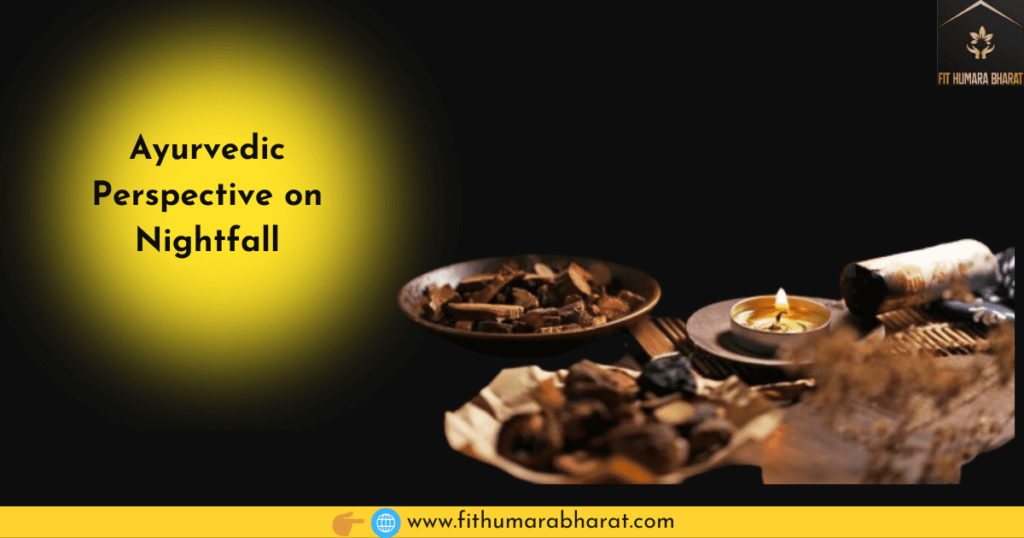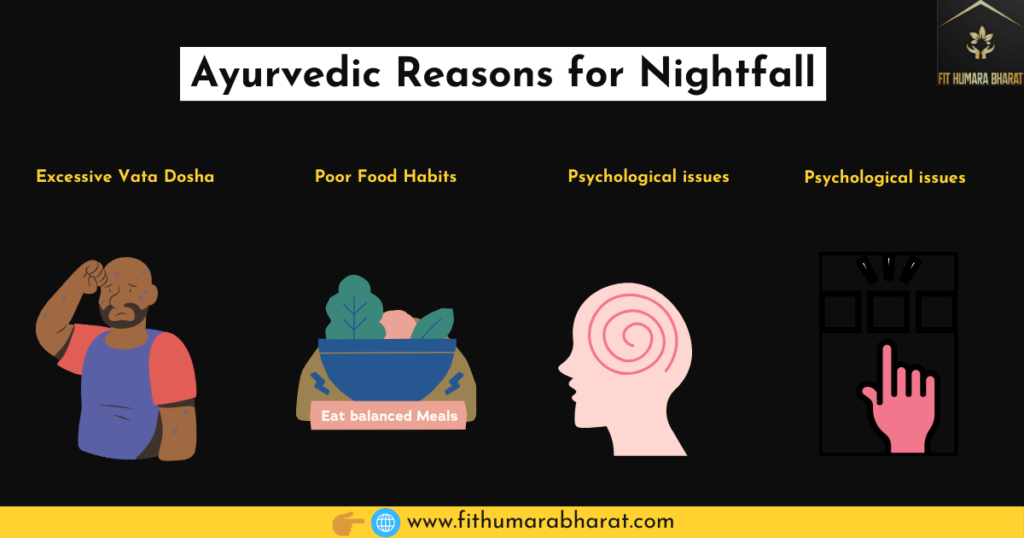Nightfall is a typical observable fact, particularly in men, sometimes it referred to as nocturnal emission or spontaneous ejaculation during sleep.
A darkness of few hours and there are accepted as usual, but regular and delayed darkness might cause people to become concerned and look for solutions. By addressing the underlying causes and fostering general wellbeing, the age-old Indian medical system known as Ayurveda provides a comprehensive approach to treating nightfall.
Parents DON’T run away from your child!
When a boy reaches puberty, they might face nightfall. The father doesn’t speak with his son on such body changes, while mother due to culture restriction is shy-enough to speak.
Imagine a child situation here, one fine morning the child gets up and find his bed/bedsheet wet – but he is unsure and blank. His parents find this situation and gets emotional by shouting or getting angry at him. The boy assumes that he is guilty, ashamed and demotivated of no reason. This emotionally disturbs the child.
This parental approach- of shouting, ignoring nightfall is definitely not a correct approach!
The child is not understanding such changes in his hormones and tend to approach their friend circle, who are equally unware about the biological changes in body, leading to wrong information and incorrect knowledge about nightfall. The child is surely misguided by the solution.
It is high time that father-son relationship should be more stronger and the father should touch upon topics related to sex, body, nightfall, emotional behavior with his son. It is important for parents to overcome such situation of shyness and frankly speaking with their kids.
Nightfall is a natural process and if needed kid should be treated by consulting a certified Ayurvedic practitioner.
Ayurvedic Perspective on Nightfall:
An imbalance in the doshas, especially the Vata dosha, is typically associated with darkness in Ayurveda. Three elemental energies called doshas—Pitta, Kapha, and Vata—control many bodily physiological and psychological processes. The excess of Vata that disrupts the reproductive system is thought to cause nightfall.
Each person has a different Prakriti as per Ayurveda, or constitution, that is considered holistically. Considering lifestyle, nutrition, and mental health variables, this individualized approach enables customized treatment approaches.

Ayurvedic Reasons for Nightfall:
1. Excessive Vata Dosha:
As per Ayurveda, nightfall is a sign of an unbalanced Vata dosha, which is connected to the components of the atmosphere and air. The reproductive system may be impacted by too much Vata, which may also get in the way with the body’s normal energy flow.
2. Poor Food Habits:
The second factor that contributes to darkness is poor food habits. A balanced diet that promotes general health is essential, according to Ayurveda. Eating meals high in oil, spice, or weight might upset the Pitta dosha and cause imbalances.
3. Psychological issues:
Anxiety, stress, and other psychological issues may throw off the body-mind equilibrium. Ayurveda acknowledges the connection between the two.
Since stress management and emotional wellbeing are crucial for maintaining mental and physical health,
4. Lifestyle Choices:
Inactive lifestyles, Unsettling habits and irregular sleep patterns may all lead to dosha imbalances. To encourage balance, Ayurveda recommends following a daily schedule (Dinacharya) that corresponds with the cycles of nature.

Methods of Ayurvedic Medicine:
The objectives of Ayurvedic therapy for nighttime are boosting the reproductive system, restoring dosha balance, and enhancing general health. Ayurvedic medicine’s mainstays are as follows:
1. Achieving Dosha Balance:
To customise therapy, Ayurvedic physicians evaluate a patient’s Prakriti and present doshic imbalances. Using certain herbs to soothe inflamed doshas is one of the balancing approaches, along with dietary changes and lifestyle adjustments.
The Ayurvedic approach to health maintenance lays significant emphasis on food choices. Those suffering from problems related to dusk can be recommended to adopt a Vata-balancing diet that includes warming, nourishing meals and steers clear of those that are too dry or chilled. Dates, almonds, and ghee are foods high in nutrients that may be advised.
2. Herbal Remedies:
Ayurvedic herbs are essential in treating nightfall. For their reviving and aphrodisiac qualities, ashwagandha, Shatavari, and gokshura are often recommended. It’s thought that these herbs regulate hormones and support a robust reproductive system.
To calm the nervous system and balance Vata, Ayurveda recommends using Abhyanga or therapeutic oil massage. Good sleep may be facilitated by self-massaging with warm sesame oil before bed. This helps to soothe the body and mind.
3. Yoga and Pranayama:
Deliberate breathing techniques (pranayama) and Some yoga asanas (poses) will help in improving general well-being and reducing stress. For each individual Ayurvedic practitioners may suggest an individualized yoga routine customized to the distinctive demands.
4. Slumber Habits That Promote Health:
The core principle of Ayurveda is to establish a regular sleep schedule that is in harmony with your body’s natural circadian cycles. The keys to resolving nighttime troubles include making a quiet sleep environment, avoiding stimulating activities before bed, and getting in early.
5. Detoxification (Karma-based):
Using Panchakarma, an Ayurvedic purification procedure, may be advised in extreme situations. Toxin removal and balance restoration are the goals of these treatments. Procedures like Virechana (purgation) and Basti (enema) may be part of Panchakarma, administered under the supervision of qualified professionals.
Avoidance Actions:
Preventive efforts to preserve general health and avoid imbalances are highly valued in Ayurveda medicine. Nightfall may be avoided by implementing the following habits into one’s daily routine:
1: Balanced Lifestyle:
It’s important to have a balanced lifestyle that includes regular exercise, stress reduction, and enough sleep. As per Ayurveda Regular daily practices (Dinacharya) are important to maintain natural cycles.
To prevent the loss of vital energy (Ojas), Ayurveda recommends moderation in sexual practices. A reproductive system out of balance may result from overindulgence or repression.
2. Stress Reduction Techniques:
Engaging in stress-reduction practices like deep breathing, mindfulness, and meditation may improve general well-being wellbeing and stave against psychological issues that might precipitate darkness.
3. Healthy Eating Practices:
Eating a broad range of fruits, vegetables, whole grains, lean meats, and other healthy, balanced foods promotes general health and helps ward against doshic imbalances.
Seek Advice from a Practitioner of Ayurveda:
Parents should help understand their children and consult a certified Ayurvedic practitioner with chronic nightfall or interest in receiving Ayurvedic therapy. A personalized and successful treatment plan can only be created after a comprehensive evaluation of the patient’s lifestyle, medical history, and doshic imbalances. Given their holistic nature, ayurvedic therapies might be slow to produce noticeable effects. Long-term advantages require being patient and consistent in adhering to the recommended routine.
Thank you
- Ayurvedic Medicine: In Depth
- Evaluation of Stambhanakaraka Yoga and counseling in the management of Shukragata Vata (premature ejaculation)
- Ayurvedic management of necrozoospermia – A case report
- A glimpse of Ayurveda – The forgotten history and principles of Indian traditional medicine
- Ayurvedic research and methodology: Present status and future strategies




 Sources
Sources